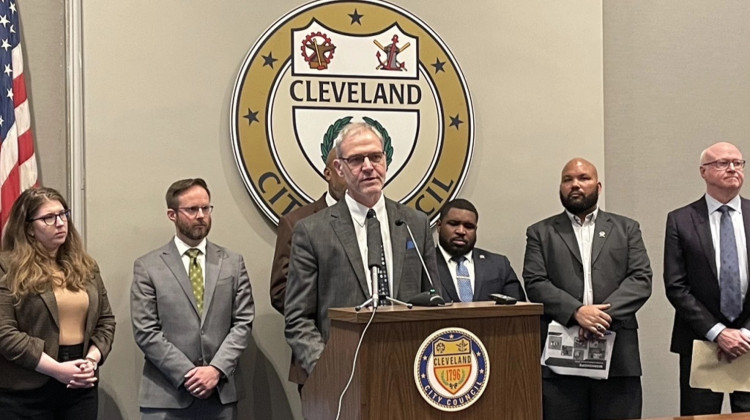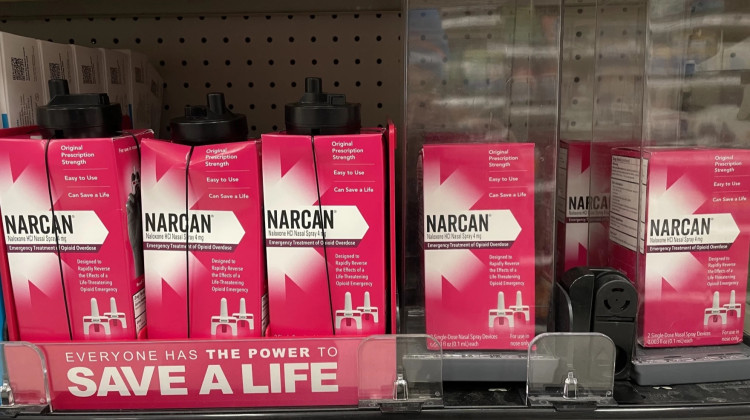
Cleveland Ward 13 representative Kris Harsh was one of the city council members to suggest working with the nonprofit RIP Medical Debt to cancel city residents' past-due health care debts.
Taylor Wizner / Ideastream Public MediaAmericans owe medical debt adding up to a staggering $220 billion, according to an analysis of recent census data. It’s a vicious cycle that traps millions of people — many of whom are already sick, have a disability or are living on low incomes.
And it seems the U.S. has a long way to go to legislate itself out of this complicated problem. Now, some cities in the Midwest have started buying up medical debt to help their residents.
So, what does that mean? And how can the average health care consumer deal with large medical bills? That’s The Checkup’s question for today.
Side Effects Public Media’s Community Engagement Specialist Lizzy McGrevy spoke with Ideastream Public Media and Side Effects Reporter Taylor Wizner to learn more.
This transcript has been edited for style, length and clarity.
Lizzy McGrevy: Can you put things into perspective here and tell us how big the medical debt problem is?
Taylor Wizner: It’s enormous. People get into debt after unexpected high-cost medical emergencies, like they break their arm or they get cancer.
There are 58 million Americans carrying some form of medical debt, according to a study published in the Journal of the American Medical Association in 2021.
It’s also a leading cause of bankruptcy in the U.S.
McGrevy: I have heard that some cities are trying to buy up this debt — can you give examples and tell us what that means?
Wizner: An idea started in Cook County, Illinois and spread to other communities –– that cities and counties could use some of American Rescue Plan Act funds to buy up residents’ medical debts for a fraction of the actual amount of the debt owed.
They do this by working with an intermediary, a nonprofit called Undue Medical Debt. The nonprofit goes to hospitals and says we will buy your old debt, which you may have already written off, at a steep discount. And so, they’re basically giving the hospital money they wouldn’t be able to collect, and removing the bill from people’s credit history.
Cities like Cleveland, Ohio looked at it as almost a stimulus they could give to working and middle class residents that would relieve a burden.
“Medical debt is like a monkey on your back... It interferes with your credit score,” Cleveland City Council member Kris Harsh said. “When you try to buy that house or get a car, your medical debt could be a detractor keeping you from making those next steps in your life.”
McGrevy: Taylor, on the face of it, this sounds like a great, helpful thing to do. But there are some people critical of this movement — can you tell us more about why that is?
Wizner: People fall into one of two camps. Some don’t think their tax dollars should go to helping other people cover their bills.
Then, there’s another group who are maybe more sympathetic to people who find themselves stuck with an unexpected medical bill, but who worry medical debt relief doesn’t go far enough.
A study came out recently that looked at the earliest group of people helped by that nonprofit I mentioned –– Undue Medical Debt –– and it found people who had their debt erased didn’t see big changes in their mental or financial health.
Undue says there needs to be more research. But they also agree, I think, with the premise that a one time clearing of debt, won’t entirely fix the problem of our expensive health care system.
Some people say medical debt relief programs incentivize hospitals to keep increasing their prices. Because there’s no direct price regulation in the U.S., hospitals can charge as much as they think insurance companies will pay.
McGrevy: So, for the average person, who hasn’t had their debt bought up, what are some things to keep in mind or tips to lower their medical bills and make sure they are not being unfairly charged?
Wizner: Right, so one reason people find themselves with medical debt has to do with failures from the hospital to provide financial assistance when they should.
Jared Walker, founder of nonprofit Dollar For, says anyone who gets a big bill should first see if their hospital will cover it outright.
“The first thing should be to go and check to see if you're eligible for charity care because most hospitals in America are nonprofit organizations, and they have to have these policies,” Walker said.
Broadly, you may qualify for financial assistance if, for a single person, you make $46,000 or less, or for a family of four, you make $97,000 or less, but this varies by state.
If that doesn’t work, Walker says you can request an itemized bill, which breaks down exactly what you’re being charged for and how much, and go through that line by line and check billing codes to make sure the hospital billed your insurance company properly.
Then, if your insurance company denies a claim they should cover, you can appeal that.
Also, he says you can negotiate your bills. He said he’s never seen a hospital bill you couldn’t get the hospital to lower. If that doesn’t work, he says ask the hospital to put you on a payment plan. Just don’t put it on your credit card if you can help it.
McGrevy: Taylor, thank you so much for this valuable information.
If you have a question about our complex medical system or any health care related issues you’d like to know more about, you can reach out to The Checkup and Side Effects Public Media at news@wfyi.org.
Side Effects Public Media is a health reporting collaboration based at WFYI in Indianapolis. We partner with NPR stations across the Midwest and surrounding areas — including KBIA and KCUR in Missouri, Iowa Public Radio, Ideastream in Ohio, KOSU in Oklahoma and WFPL in Kentucky.
 DONATE
DONATE







 Support WFYI. We can't do it without you.
Support WFYI. We can't do it without you.